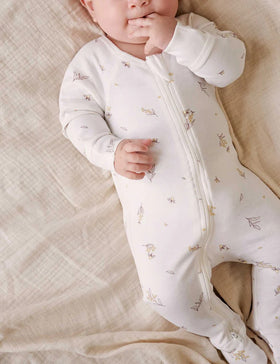
Newborn Baby - Go Organic or No Need?
As a new parent, you might be overwhelmed by the plethora of baby products available. One of the critical decisions you must make is choosing organic products for your newborn or not. This article will discuss the importance of going organic for babies, the vital things to look out for, and how to start your organic journey.
Why is Organic Important for Babies?
Organic products are made without synthetic chemicals, pesticides, and genetically modified organisms (GMOs). Here are some key reasons why going organic is important for your baby:
-
Sensitive Skin: Babies have delicate and sensitive skin, which is more prone to irritation and rashes. Organic products are made with natural ingredients that are gentle on their skin, reducing the risk of allergies and skin problems.
-
Immune System Development: Babies' immune systems are still developing, making them more susceptible to illnesses. Organic products are free from harmful chemicals that can hinder their immune system development.
-
Long-term Health: Exposure to chemicals and toxins at an early age can have long-term effects on a child's health. Choosing organic products can help reduce the risk of developing chronic health issues later in life.
-
Environmental Impact: Organic farming practices are more sustainable and have a lower environmental impact. Choosing organic products also contributes to a healthier planet for your child's future.
Critical Things to Look Out for When Going Organic
When it comes to going organic for your baby, here are the key areas to focus on:
-
Food: Organic baby food is made without synthetic pesticides, artificial additives, and GMOs. Look for certified organic labels on baby food products to ensure they meet the required standards.
-
Clothing: Organic baby clothes are made from natural fibres like organic cotton, grown without synthetic pesticides and fertilizers. These clothes are gentle on your baby's skin and help prevent skin irritation.
-
Skincare: Organic baby skincare products are made with natural ingredients and are free from harmful chemicals. Look for products with certified organic labels and avoid those containing parabens, phthalates, and synthetic fragrances.
-
Toys: Opt for toys made from organic materials like wood, organic cotton, and natural rubber. These toys are safer for your baby as they do not contain harmful chemicals that can be ingested or inhaled.
-
Bedding: Choose organic bedding materials like organic cotton sheets, blankets, and mattresses. These materials are free from chemical flame retardants and other harmful substances.
How to Go Organic from the Start
Here are some tips on how to start your organic journey with your newborn:
-
Research: Educate yourself about the benefits of organic products and learn how to identify genuine organic labels.
-
Prioritize: Focus on critical areas like food, clothing, and skin care. Gradually incorporate organic products into other aspects of your baby's life.
-
Shop Wisely: Look for certified organic products from trusted brands. Compare prices and read reviews to ensure you get the best quality products for your baby.
-
Join a Community: Connect with other parents going organic for their babies. Share tips, experiences, and support each other in making healthier choices for your little ones.
In conclusion, going organic for your newborn is a personal choice that can significantly benefit your baby's health and the environment. Focusing on the critical areas and making informed decisions can give your baby a healthier start in life.


